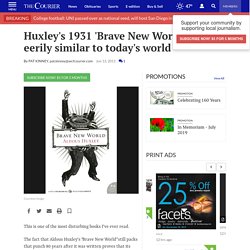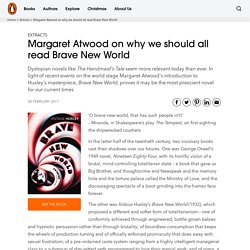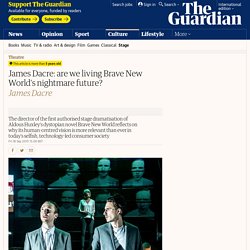

Brave New World.: Literary Reference Center - powered by EBSCOhost. Confronting the Digital Divide: Debunking Brave New World Discourses.: Literary Reference Center - powered by EBSCOhost. (46) Brave New World Summary by Shmoop. (46) Brave New World (1956) - Aldous Huxley as Narrator. Brave New World vs. The Contemporary Society By James Wang - by James Wang. Brave New World Infographic. Huxley's 1931 'Brave New World' eerily similar to today's world. This is one of the most disturbing books I've ever read.

The fact that Aldous Huxley's "Brave New World" still packs that punch 80 years after it was written proves that its message and its writing have stood the test of time. What is particularly chilling about Huxley's masterpiece is how close our world has come to the one he envisioned in 1931. It is a genetically engineered, behavior-modified, overmedicated, oversexed world in which youth and appearance are valued, the superficial is put on a pedestal and the family is virtually nonexistent.
People are "decanted" in test tubes, not born, and placed into different classes or castes depending on the chemistry applied to them when they are cloned. Virtually all pain and suffering have been removed from the civilized world; jobs are occupational therapy and stress is managed by the ingestion of mass-distributed drugs. We can't do it without you. Black Friday Started Early! SALE! Sorry, your subscription does not include this content. Brave New World predicted today better than any other novel.
This 1931 novel predicted modern life almost to a (model) T.

While other dystopias get more press, Brave New World offers us a nightmare world that we've moved steadily towards over the last century.Author Aldous Huxley's ideas on a light handed totalitarian dictatorship stand in marked contrast to the popular image of a dictatorship that relies on force. When most people think of what dystopia our society is sprinting towards, they tend to think of 1984, The Handmaid's Tale, or the Hunger Games. These top selling, well known, and well-written titles are excellent warnings of worlds that could come to pass that we would all do well to read. However, one lesser-known dystopian novel has done a much better job at predicting the future than these three books. Brave New World, written in 1931 by author, psychonaut, and philosopher Aldous Huxley, is well known but hasn't quite had the pop-culture breakthrough that the other three did.
Henry Ford With His Model T. (Getty Images) Mass consumerism. Margaret Atwood on why we should all read Brave New World. I first read Brave New World in the early 1950s, when I was fourteen.

It made a deep impression on me, though I didn’t fully understand some of what I was reading. It’s a tribute to Huxley’s writing skills that although I didn’t know what knickers were, or camisoles – nor did I know that zippers, when they first appeared, had been denounced from pulpits as lures of the Devil because they made clothes so easy to take off – I nonetheless had a vivid picture of ‘zippicamiknicks’, that female undergarment with a single zipper down the front that could be shucked so very easily: ‘Zip!
The rounded pinkness fell apart like a neatly divided apple. A wriggle of the arms, a lifting first of the right foot, then the left: the zippicamiknicks were lying lifeless and as though deflated on the floor.’ I myself was living in the era of ‘elasticized panty girdles’ that could not be got out of, or indeed into, without an epic struggle, so this was heady stuff indeed. James Dacre: are we living Brave New World's nightmare future? Aldous Huxley wrote Brave New World in 1931 in the shadow of the first world war, the Wall Street Crash and a devastating flu virus that had claimed millions of lives.

The Treaty of Versailles had carved out a new Europe, while electricity, the automobile, production lines, new mass media and aeroplanes were changing the world. England was in the grip of a depression, but science and technology promised a better future: a world where disease, drudgery and poverty might no longer exist. Very few writers were bold enough to challenge this naive optimism but in Brave New World, Huxley certainly did; now his work, adapted by Dawn King for the stage and premiering at Royal and Derngate, Northampton, challenges audiences to do the same.
Huxley was concerned with those who had little say in their society, who were at the mercy of an all-powerful elite. Netflix. BraveNewWorld.